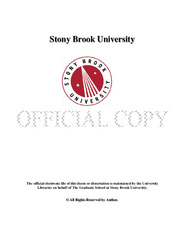| dc.identifier.uri | http://hdl.handle.net/11401/77754 | |
| dc.description.sponsorship | This work is sponsored by the Stony Brook University Graduate School in compliance with the requirements for completion of degree. | en_US |
| dc.format | Monograph | |
| dc.format.medium | Electronic Resource | en_US |
| dc.language.iso | en_US | |
| dc.publisher | The Graduate School, Stony Brook University: Stony Brook, NY. | |
| dc.type | Dissertation | |
| dcterms.abstract | We present two software tools useful for the analysis of mesh based physics application data, and specifically for turbulent mixing simulations. Each has a broader, but separate scope, as we describe. Both features play a key role as we push computational science to its limits and thus the present work contributes to the frontier of research. The first tool is Wstar, a weak* comparison tool, which addresses the stochastic nature of turbulent flow. The goal is to compare underresolved turbulent data in convergence, parameter dependence, or validation studies. This is achieved by separating space-time data from state data (e.g. density, pressure, momentum, etc.) through coarsening and sampling. The collection of fine grained data in a single coarse cell is treated as a random sample in state space, whose cumulative distribution function defines a measure within that cell. This set of measures with the spacial dependence defined by the coarse grid defines a Young measure solution to the PDE. The second tool is a front tracking application programming interface (API) called FTI. It has the capability to generate geometric surfaces (e.g. the location of interspecies boundaries) of high complexity, and track them dynamically. FTI also includes the ghost fluid method, which enables mesh based fluid codes to maintain sharpness at interspecies boundaries by modifying solution stencils that cross such a boundary. FTI outlines and standardizes the methods involved in this model. FronTier, as developed here, is a software package which implements this standard. The client must implement the physics and grid interpolation routines outlined in the client interface to FTI. Specific client programs using this interface include the weather forecasting code WRF; the high energy physics code, FLASH; and two locally constructed fluid codes, cFluid and iFluid for compressible and incompressible flow respectively. | |
| dcterms.available | 2017-09-20T16:53:30Z | |
| dcterms.contributor | Glimm, James | en_US |
| dcterms.contributor | Samulyak, Roman | en_US |
| dcterms.contributor | Li, Xiaolin | en_US |
| dcterms.contributor | Ladeinde, Foluso. | en_US |
| dcterms.creator | Kaufman, Ryan | |
| dcterms.dateAccepted | 2017-09-20T16:53:30Z | |
| dcterms.dateSubmitted | 2017-09-20T16:53:30Z | |
| dcterms.description | Department of Applied Mathematics and Statistics. | en_US |
| dcterms.extent | 89 pg. | en_US |
| dcterms.format | Application/PDF | en_US |
| dcterms.format | Monograph | |
| dcterms.identifier | http://hdl.handle.net/11401/77754 | |
| dcterms.issued | 2014-12-01 | |
| dcterms.language | en_US | |
| dcterms.provenance | Made available in DSpace on 2017-09-20T16:53:30Z (GMT). No. of bitstreams: 1
Kaufman_grad.sunysb_0771E_12183.pdf: 1153348 bytes, checksum: f95d92bb28467a726acdaa2d0dc42513 (MD5)
Previous issue date: 1 | en |
| dcterms.publisher | The Graduate School, Stony Brook University: Stony Brook, NY. | |
| dcterms.subject | Applied mathematics | |
| dcterms.subject | Front Tracking, LES, Mesh Convergence, Stochastic Convergence, Weak* | |
| dcterms.title | Software Tools for Stochastic Simulations of Turbulence | |
| dcterms.type | Dissertation | |

